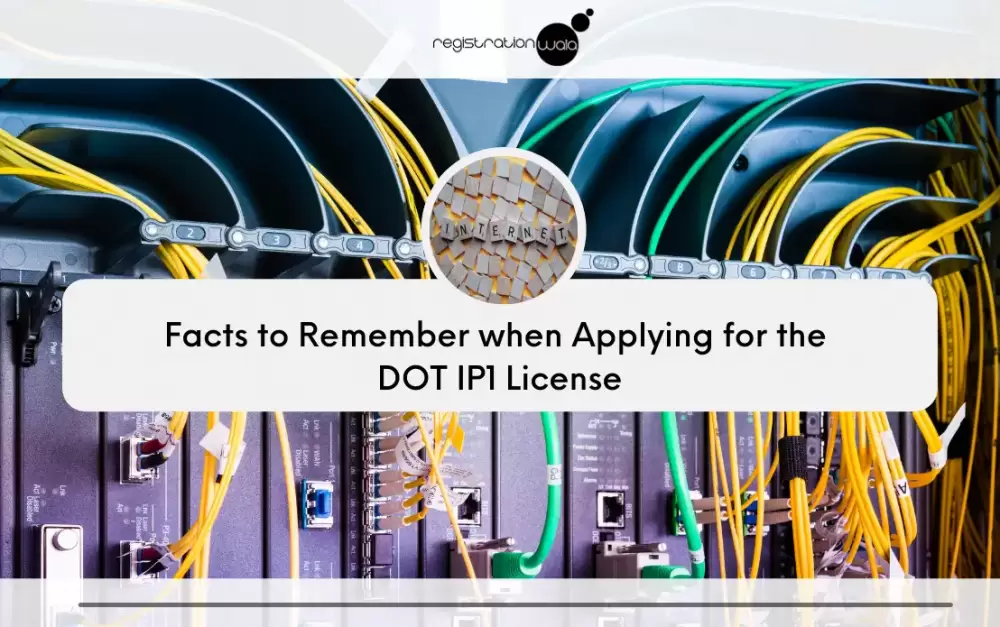What you must know when you’re applying for the IP1 License in India?
- May 23, 2022
- Registrationwala

- Home
- /
- Knowledge Base
- /
- Other Registrations & Licenses
- /
- IP1 License
- /
- What you must know when you’re applying for the IP1 License in India?
What you must know when you’re applying for the IP1 License in India?
What you must know when you’re applying for IP1 License? There are lots of points you must keep in mind. We have discussed the most important ones among them through this blog.
When it comes to niche business licenses – business licenses that or for specific types of businesses – there is no license with more niche crowd than the IP 1 License. It’s the permission to start infrastructure as a service. India, a country where the telecom industry has gone from being an adolescent to an adult over the past few years, the demand for this “IP License” has also increased. many are rushing towards the opportunity to start a business providing infrastructure as a service.
But that rush has made many look over several crucial points about the license. In this article, we are going to compel them – and probably you – to look at those crucial points. They are:
- What kind of infrastructure you can provide with the license?
- Which authority provides the Ip1 License?
- What is the process of getting the license?
- What are the documents you require to get the required license?
Let’s begin to answer these questions in a non-rushed way.
What kind of infrastructure you can provide with the license?
When you’re providing infrastructure as a service to the telecom industry, it’s easy to forget which infrastructure we are talking about. If you’re applying for IP 1 License, you’re concerned with providing the following “non-electrical” infrastructures:
- Towers: Towers are the communication conduit that makes it possible for the telecom industry to provide telephony services.
- Base Stations: Without base stations, you can’t go from wired to the wireless, for it’s the gateway between those types of signals.
- Right of Way: The right or the permission to access the telecommunication resources is a resource in itself. Infrastructure as service providers make it possible for telecom industry to have that resource.
- Antennas: Telecom industry deals with a variety of narrow band frequencies. Managing those needs the aid of antennas.
- Duct Space: electrical equipments need proper ventilation if you want to them to work for a long time. Duct space provide proper passages that make it easy for the heat to move out.
The passive or non electrical resources that come under infra as a service are too many to count. But, with this section you now have an idea of what resources you can provide if you follow the IP1 license procedure.
Which authority of responsible for providing IP1 License?
When there is telecom, there is a department that manages it. In India, that responsibility is on the shoulders of Department of Telecommunication (DOT). Working under the Ministry of Communication, DOT is known as the strictest government departments when it comes to licensing.
That’s why, you need to take care that you follow all the steps correctly if you want to the IP 1 License in India.
Also Read: 5 Myths about IP1 License that stops you from getting it
What is the procedure to get the IP1 License?
The Ip1 License required by you to become an infrastructure provider can be obtained with the steps as following:
- Furnish all the required documents.
- Fill and submit the “offline” Ip1 License application form.
- Monitor the assessment that the Department of Telecommunication would conduct on your application.
- Be ready to follow up with the DOT if it requires additional documents from your end.
- Once the Department is thoroughly satisfied with your conduct, your application and the documents you’ve provided, you’ll obtain the IP1 License.
Documentation needed for IP1 License
Like it’s always said – all applications are invalid without the right documentation. For IP1 License, attach the following with the application:
- Certificate of incorporation of the entity (your company) that’s applying for the license.
- MOA in which it’s mentioned that providing infra as a service is that entity’s business objective.
- Articles of Association
- KYC of all the directors of the company.
- List of all the shareholders of the company.
- List of all the resources you’re planning to rent or lease to the Telecom industry.
- Demand draft of the IP1 License fees.
What comes after getting the license?
DOT doesn’t give the license to just anyone. Thus, once you obtain the license, your trials aren’t over yet. You’d have one month after getting the license to sign an agreement with a telecom company. Once you have done so, submit a copy of that agreement to the Department of Telecommunication. By doing that, you’ll validate your IP1 License. If one month passes and the Department is yet to see the agreement from your side, it will invalidate your license.
- 3365 views
